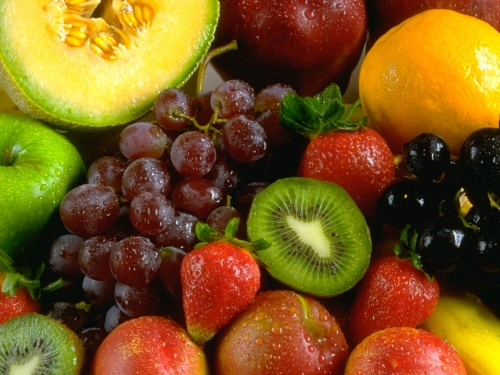
It’s five servings a day, it’s the slow-blossoming bloom on a tree, it’s the most colorful part of the grocery store, it’s shaped like stars or circles or cardiods—it’s fruit.
And, according to the New York Times, for people in India, it’s specifically the mango. No other fruit has so many cultural and religious connotations, nor is any other fruit considered as sensual. In a related blog post, Heather Timmons insists that “the mango finds a more exalted, and frequent, place in Hindu mythology that the apple does in Christianity.”
But if India has claimed the mango as its national fruit, then what about the other countries of the world?
For America, regardless of its Puritan roots, it's apples. Johnny Appleseedhas been enshrined in legend here. (He actually was a real person—a devout Swedenborgian in fact.) But my memories are of picking apples at Eckert’s orchard; when I went to college, there were bus trips to go apple-picking in New England. My aunt in California has fruit trees in her backyard, including an apple tree. At home we have an apple peeler and corer for apple pie and apple tarts and apple crisps. George Washington’s cherries and Georgia’s peaches just don’t represent America as perfectly. As mangos are to India, so apples are to America.
Sweden has been co-opted by IKEA, which advertises lingonberry jam and straight-up lingonberries as authentically Swedish. One of my college roommates from Norway couldn’t stop raving about cloudberries, especially with cream. On the other side of the world, rambutans are intertwined with my notions of Malaysia.
My close friend insists that Russia once had the best strawberries, near Chechnya, and the Chechen writer German Sadulaev agrees. In I Am a Chechen! he begins an digression with the unforgettable words, “Once my memory was a strawberry field. Now my memory is a minefield.” From there, he describes how he used to pick strawberries in a field near his home. But, he writes, mines were laid in those fields, many of which exploded when people stepped on them, and “strawberries grow well in fields watered with thick, rich human blood.” On the horizon, as well as in his mind, the strawberry fields have become minefields.
But Russia might have to settle for a different, less bloody fruit. France boasts many delicacies, but I’ve never been able to forget Edouard Levé’s beautiful formulation: “When I look at a strawberry, I think of a tongue, when I lick one, of a kiss.” Since then, I’ve never been able to taste strawberries without being reminded of French kisses.
Israel, for me, will always be the land of oranges. The weather is unforgivably hot and dry, and I can’t count how many shekels I’ve spent on fresh-pressed orange juice at a tiny stall after a thirst-inducing hike across sandy terrain. And I can still remember the small orange trees in Jerusalem and Tel Aviv’s plazas, whitewashed with fungicidal paint. Not figs, not olives, but Jaffa oranges.
What about the rest of the world? I’m waiting for my friend to come back from Japan with akebi. And then I need to start cataloging all the other countries: Nigeria, Ecuador, Sri Lanka, Italy, New Zealand . . .

Did you survive the tote bag frenzy that was BEA 2012?
Maybe take a breather and eat a mango if your nerves are still on edge.
And leave it to Oprah to make all your book selections from now on.
Though, if you ask Zadie Smith, she still holds complete faith in libraries.
Just try to avoid Amazon if you're not trustful of corporate behemoths.
But if you're not, just make sure you don't Nook a flame you can't put out.
You may end up with something worthy of the scariest post-apocalypse novel.
Which may come about from a war between the grammar gods.
Though the end already seems near for the Israeli publishing world.
Let's hope someone takes advantage of all of this drama and makes a good graphic novel out of it.
Image source: The Trustees of the British Museum






 A Black Balloon Publication ©
A Black Balloon Publication ©